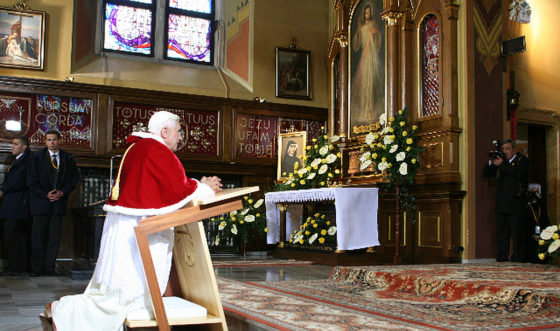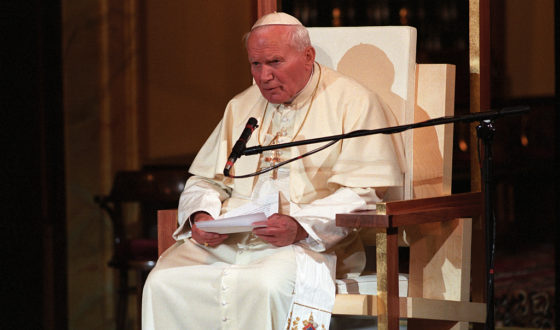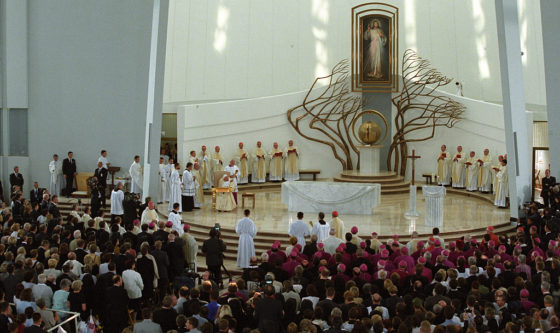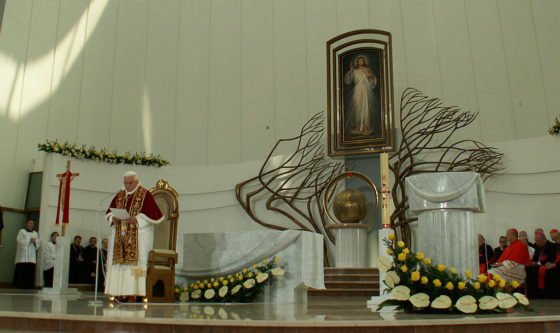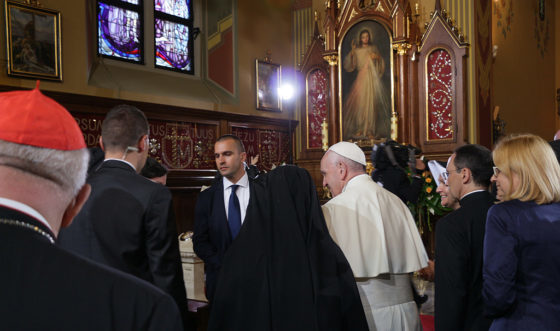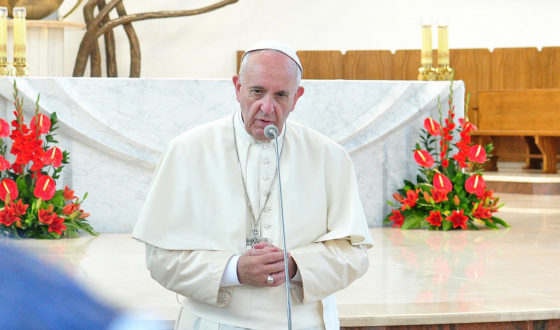Papal pilgrimages to the Shrine of The Divine Mercy
in Kraków-Łagiewniki
The centre of devotion to the Divine Mercy at Łagiewniki has hosted the head of the Catholic Church on four occasions. Pope John Paul II came on pilgrimage twice, on 7 June 1997 and on 17 August 2002. Pope Benedict XVI visited Łagiewniki on 27 May 2006. Pope Francis was in Łagiewniki on 30 July 2016. Each of these pilgrimages has left its mark, not only on the history of the Łagiewniki Shrine, but also on the history of the Church: they have all put the spotlight on “the gift of God for our times,” the message of Mercy transmitted by Sister Faustina recalling the biblical truth of God’s merciful love for every human being.
In the course of less than two decades the Łagiewniki Sanctuary experienced no fewer than four papal pilgrimages. Why was this so?
The reason for the papal pilgrimages, and why millions of pilgrims come to this place is certainly not its natural attractiveness, but the great gift God has left here, the message of His merciful love for every human being. It is the message which God has passed on to us through the services of Sister Faustina, today a saint. She lived and died here; here her mortal remains have been laid to rest. That is why the focus of her life’s work to spread the message of Mercy is here. From here it is being spread all over the world. Karol Wojtyła soon learned of this gift when he was working in the Solvay quarry nearby, he used to come to our Łagiewniki chapel and pray before the image of the Merciful Jesus. When he was ordained and dispensed a pastoral service in Kraków, he took part in the celebrations in honour of the Divine Mercy initiated by Sister Faustina’s Cracovian confessor, Father Józef Andrasz SJ. Later, when he was the local bishop, he conducted the diocesan information process which eventually led to Sister Faustina’s canonisation; and, as Pope, he conducted the ceremonies for her beatification and canonisation. As his life drew to a close, in his book Memory and Identity John Paul II wrote that the message of Divine Mercy which Sister Faustina handed down let people survive the cruel times of World War Two, and that it is the only truth capable of outweighing the evil of the world: it is the truth of God’s mercy. John Paul II spoke about this message in the context of Fascism and Communism, the two totalitarian systems which Europe experienced in the twentieth century. The Truth of the merciful God applies to every evil present in humankind and in the world. God’s mercy is greater than all evil. The Holy Father John Paul II called Sister Faustina’s Diary, in which she took down this message at Jesus’ express command, “the Gospel of Mercy written from a twentieth-century perspective.” He came to Łagiewniki twice as successor to St. Peter, to proclaim this gift of God to the world, because, as Jesus said to Sister Faustina, “Mankind shall not find peace and contentment until it turns with trust unto My mercy.” The Holy Father knew that the only hope, salvation and remedy for humankind today and for the world is to turn confidently to the Divine Mercy.
Pope John Paul II made his first pilgrimage to Łagiewniki on 7 June 1997. Could you describe the circumstances and message he delivered?
The first papal pilgrimage to the Shrine of Łagiewniki was a very small-scale event. It was a Saturday evening. Those present had been praying for a long time when the Holy Father arrived at our Chapel of the Merciful Jesus and the tomb of St. Sister Faustina. Most of those attending inside the Chapel were Sisters of our Congregation; those outside were the girls from the Youth Educational Centre (run by the Sisters), members and volunteers of the Faustinum Association, our benefactors and donors, and people associated with the Shrine and our Congregation. Strictly speaking, the Pope had a fairly private meeting with our Sisters, but what he said applies to all people.
Four ideas the Pope put forward have been engraved in my memory. The first is a message for all people, and declares that mercy is the most important thing in everyone’s life. There is nothing that humans need more than Divine mercy: that love which is benevolent and compassionate, which raises man above his weakness to the infinite heights of the holiness of God. The second message is addressed to the pilgrims who visit Łagiewniki. The Holy Father said that anyone could come here, look at the picture of the Merciful Jesus with His Heart radiating grace, and in the depths of their soul hear what Saint Faustina heard: ‘Fear not, I am always with you’ (Diary 613). And if their heart responds with a sincere declaration, Jesus, I trust in you, they will find comfort in all their fears and anxieties. The third thing I remember the Pope saying was his personal thanksgiving when he was praying before the image of the Merciful Jesus; it was his gratitude for being able to fulfil Jesus’ will and establish the Feast of Divine Mercy. At the time, the celebration of the new feast day was limited only to Poland. But the Pope also said that the message of Mercy had always been close to his heart, that he was taking it back with him to the See of Peter, and that it was the very essence of his pontificate. The fourth message was addressed to our Congregation. The Holy Father highlighted the need for Sister Faustina’s charism and encouraged us to do all we could to spread and promote it. ‘Christ has made your Congregation the guardian of this place, and at the same time He has called you to a particular apostolate, in the service of His mercy. I ask you to accept this responsibility! The people of today need your proclamation of mercy: they need your works of mercy and your prayers for mercy. Do not neglect any of these aspects of your apostolate,’ he told us.
On 17 August 2002 Pope John Paul II came to Łagiewniki for the second time and on this occasion for a specific purpose, that is, to dedicate the new church. He not only consecrated the basilica, but entrusted the whole world to the Divine Mercy. What are your memories of this second pilgrimage and its message?
Pope John Paul II’s second pilgrimage to Łagiewniki was quite different. The Holy Father came to consecrate the Shrine’s new church. As we remember, the motto of his last pilgrimage to his homeland was ‘God is rich in mercy,’ so it carried a beautiful observation about the mystery and message of Divine mercy, St. Faustina, and this great entrusting of the world to Divine mercy. People didn’t expect the Pope to say this, but were overjoyed to hear it.
The dedication of the Basilica created the right atmosphere for what the Holy Father wanted to say about the Shrine of Łagiewniki. He said that although the whole world and all time belong to God, nevertheless there are places and times He has especially chosen, in which people experience His presence and grace more profoundly. People make pilgrimages to these places because they are confident that there they will come closer to God. ‘I am convinced that the Shrine of Łagiewniki is the special place God has chosen to pour out the grace of His mercy,’ he said.
I think the most moving words he said were those about the ‘spark’ which is to prepare the world for the final coming of Christ. Some think that the spark referred to in Sister Faustina’s Diary is Faustina herself; some think it is John Paul II. But in fact the Holy Father’s address clearly shows that the spark is the message of Divine mercy which radiates out from Łagiewniki all over the world. The Holy Father said that he wanted the message of God’s merciful love, proclaimed here through the services of Saint Faustina, made known to all the peoples in the world and fill their hearts with hope. ‘May this message emanate from this place to our beloved homeland and throughout the world! May the Lord’s binding promise be fulfilled: the spark that will prepare the world for His final coming will come from here (cf. Diary, 1732). This spark must be lit by the grace of God. This fire of mercy must be passed on to the world, which will find peace and mankind its happiness in Divine mercy!’ John Paul II entrusted the task of proclaiming the message of God’s merciful love to mankind not only to the Congregation of the Sisters of Our Lady of Mercy, in which Sister Faustina lived and died, but also to the Church in Kraków and the whole of Poland, and to all the pilgrims who visit this Shrine.
Four years later, Pope Benedict XVI, John Paul II’s successor to the See of Peter, made his pilgrimage to Łagiewniki. It was the third papal pilgrimage to the Shrine.
It was on 27 May 2006. On this occasion, the Pope visited the Chapel, the Basilica and the Chapel of Perpetual Adoration. He prayed before the Holy Picture of the Merciful Jesus and the tomb of St. Faustina. Mother Gracjana Szewc, our Superior General, gave the Pope some relics of St. Faustina and he blessed the Congregation for its ministry of spreading the message of Divine mercy to the world. Then he walked to the Basilica, where he had a meeting with the sick. He greeted them, their carers, the priests who minister in the Shrine, the Sisters of Our Lady of Mercy, members of the Faustinum Association, and all present. In his address to the sick he said, “Dear friends, stricken by illness and marked by suffering in body and soul, you are most closely united with the Cross of Christ, and at the same time, you are the most eloquent witnesses of God’s mercy. Through you and your suffering He stoops down to humanity with His love. You say in silence, Jesus, I trust in you, thereby teaching us that no faith is more profound, no hope more alive, no love more ardent than the faith, hope and love of a person who is suffering yet entrusts himself to God’s hands.” Then he went to the Chapel of Perpetual Adoration for private prayer. He wrote an entry in the Memorial Book, recording his wishes for all the pilgrims who visit the Shrine: “May God who is love fill the hearts of the pilgrims who come here with the gifts of His mercy, strengthening them with His power so that they may persevere in the true faith and bear the fruits of truth, love and peace in the world today.”
What have been the effects of the papal pilgrimages to the Shrine?
Certainly not just the memory of those events, but above all a very profound teaching about God rich in mercy and emphasis on this gift from God for our times, that is, on the message of Mercy handed down to Sister Faustina. We know that when Pope John Paul II canonised Sister Faustina on 30 April 2000, he gave this message to the whole Church for the third millennium of faith. Not only are we drawing on the words which were delivered during the papal pilgrimages to Łagiewniki, and on the beatification and canonisation ceremonies, but on all the Holy Father’s teachings, especially those on the mystery of Divine mercy and human mercy. The encyclical Dives in Misericordia is an extraordinary treasure: it was the first encyclical in the history of the Church devoted entirely to this subject. It is consistent with Sister Faustina’s Diary, so much so that you might think the Holy Father had rewritten the essential message of the Diary in the encyclical and made it the official teaching of the Church.
Pope Benedict XVI has reiterated that mercy is the essential message for our times: “This message really is the key message for our times: mercy as the power of God, as God’s bulwark holding back the evil of this world.” Pope Benedict sees the spirituality and mission of St. Faustina as a new element of the Christian message. “The deep wish of this holy woman was to put God’s mercy at the heart of the Christian faith and life. Thanks to the power of her spiritual life she shed new light upon what was essentially an aspect of the Christian message that calls for special consideration in our times, times which have experienced the cruelty of officially imposed ideologies.”
At this stage in the history of the Church and the world, we find ourselves living in times when new light has been shed on the mystery of the merciful love of God for mankind. Thus these days, albeit so difficult, are so beautiful, too.
An interview with Sr. M. Elżbieta Siepak ISMM
Translated by Orest Pawlak
Pope Francis’ Prayer at the Tomb of St. Faustina
and the Sacrament of Reconciliation
On 30 July 2016, Pope Francis was the third pope to pray in the Chapel of the Merciful Jesus and the tomb of St. Faustina. The Holy Father wrote of St. Faustina in Misericordiae Vultus, the Bull of Indiction he issued for the opening of the Extraordinary Jubilee of Mercy and in a letter addressed to young people ahead of the Thirty-First World Youth Day. He encouraged them to be inspired by St. Faustina’s prayers to practise and intensify their deeds of mercy but he also went further, to assert that
“at the Shrine in Kraków dedicated to the Merciful Jesus, where He is depicted in the image venerated by the people of God, Jesus is waiting for you. He has confidence in you and is counting on you! He has so many things to say to each of you… Do not be afraid to look into His eyes, full of infinite love for you. Open yourselves to His merciful gaze, so ready to forgive all your sins. A look from Him can change your lives and heal the wounds of your souls. His eyes can quench the thirst that dwells deep in your young hearts, a thirst for love, for peace, for joy and for true happiness. Come to Him and do not be afraid! Come to Him and say from the depths of your hearts: “Jesus, I trust in You!” Let yourselves be touched by his boundless mercy, so that in turn you may become apostles of mercy by your actions, words and prayers in our world, wounded by selfishness, hatred and so much despair.
Pope Francis was the first pontiff to celebrate a penitential service in the Basilica of Łagiewniki and hear the confession of eight young people in Italian, Spanish and French. The Holy Father’s ministry helped us to look at confession in the light of the mystery of Divine Mercy, recalling the words Jesus said to Sister Faustina in the Łagiewniki Convent:
Tell souls where they are to seek comfort, in the tribunal of My mercy [the Sacrament of Reconciliation]; that’s where the greatest miracles happen all the time. To obtain such a miracle you don’t have to go on a pilgrimage to a faraway place, neither do you have to perform any outward ceremonies, all you have to do is come to one of My representatives in a spirit of faith and tell him of your misery, and the miracle of Divine mercy will come about in all its fullness.” (Diary 1448)
All the papal pilgrimages tell us how important the message from Łagiewniki is. It is the message of mercy which God communicated through the services of St. Faustina for the life of the modern Church. It is the “gift of God for our time,” as the Holy Father John Paul II said when he gave this message to the whole world for the third millennium to let people know the true face of God and Man better. Pope Benedict XVI concurred that this is “indeed the main message for our times: mercy as God’s power, as God’s bulwark stopping all the evils in the world.” Pope Francis defined the source of Divine mercy as prayer and the Sacraments, especially the Sacrament of Reconciliation, and spoke of Sister Faustina, the great mediator in the dispensation of graces. She was “the one called to enter into the depths of Divine mercy; let her intercede for us and obtain for us the grace of living and always walking in the light of God’s forgiveness and in an unwavering trust in His love.
Sr. M. Elżbieta Siepak ISMM
Translated by Karolina Socha-Duśko











